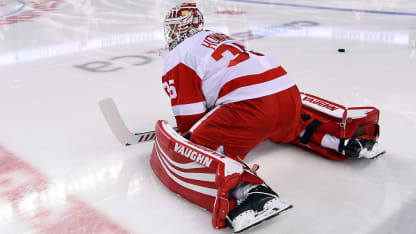Demko had his less-is-more epiphany during his first pro season. Jimmy Howard was more than a decade into his 13-year NHL career with the Detroit Red Wings before his hit.
"A couple years ago I started working with a sports psychologist I met through USA Hockey and he said, 'You've got too much going on,' so we simplified everything," Howard said. "It used to be very intense, a lot of visualization, almost to the point it was starting to mess with me."
While it's important to warm up physically with a combination of static and dynamic stretching, the recent surge in drills to warm up the eyes and hands by bouncing or juggling balls, and the brain with visualization has proven too much for some goaltenders.
"I have been a guy that wants to do everything I can to play well, so you hear these guys talk about visualization, mobility, dynamic warm ups, the juggling routines, and I would see all that and I was like, 'All right, I have to get to the rink at 3:45 or 4 o'clock, so I can fit all this in,'" Demko said. "In college, I got away with it, but my first year of pro I was exhausted 10 games in and I am like. `What is going on? We have 70 more games, I don't know if I can do this.'"
Demko started that season with an .884 save percentage for Utica (American Hockey League) before realizing his pregame routine had gone from exhaustive to exhausting.
"I would show up at the rink like what if my visualization doesn't go the right way," Demko said. "I'm not a worse goalie because I can't juggle a tennis ball as well as I did last game."
A phone call from then-Canucks goaltending coach Dan Cloutier helped Demko come to that realization and prompted him to abandon his routine. He had a .913 save percentage the rest of the season, slowly adding back pieces of his pregame routine but not to the same extent as before.
"I just showed up to the rink, played a little soccer, listened to some music, had a coffee and went out and just played and had my most fun game of the year and it was like 'Whoa, just do that again,'" Demko said. "As I built that streak I would add a little bit more of a routine each time and, before I knew it, the routine wasn't strenuous like it was before."
Howard can relate.
Like Demko, he retains key elements of his old pregame routine, but has cut the amount of time dedicated to visualization in half, for example. Like Demko and Holtby, he now feels like he's in control of his routine.

